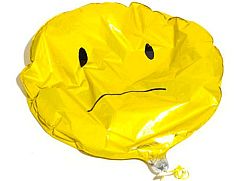
Martha said to Jesus, “Lord, if you had been here, my brother would not have died. But even now I know that whatever you ask from God, God will give you.” Jesus said to her, “Your brother will rise again.” Martha said to him, “I know that he will rise again in the resurrection on the last day.” Jesus said to her, “I am the resurrection and the life. Whoever believes in me, though he die, yet shall he live, and everyone who lives and believes in me shall never die. Do you believe this?” She said to him, “Yes, Lord; I believe that you are the Christ, the Son of God, who is coming into the world.” — John 11:21–27 ESV
The organism that you describe as you is, in itself, an ecology of organisms. In addition to the roughly 40 trillion or so cooperating cells that you like to think of as yourself, there are just as many microbes that live on you and inside you that call you home. Altogether, those 80 trillion cells go along for the conjoined ride called life and, literally, none of them are aware of the thing you describe as consciousness.
Consciousness is something we think of as an emerging property. Just like flight emerges from the parts of an airplane, consciousness apparently springs from the intricate workings of neurological parts operating in space and time. In other words, a thought, however brief, takes time and doesn’t exist at any one moment of it, like a record player doesn’t make sound if you stop the turntable from spinning.
We are much better at describing loss of consciousness than the existence of it. When the delicate balance of homeostasis collapses, and the little gray cells stop their incessant chatter, the phenomenon called “you” dissipates like air leaking from a balloon. We quickly reach a point where resuscitation is impossible. A point that we can’t detect with any precision, but we know how to describe it… we call it death.
Here in John, Martha confronts Jesus with his dereliction. Why risk showing up at all, if its for the funeral? A funeral could be done without him, what he was needed for… was a healing. But even in grief, Martha believes. She falls short of anticipating the kind of miracle that was on it’s way, but it’s hard to imagine that I would have done better.
Martha’s brother Lazarus, was not experiencing near death. He was undeniably dead. As a wealthy man, the embalming spices and burial preparations alone would have made that a reality, even if he wasn’t already dead. This is what made the miracle such a problem for the Sanhedrin. They couldn’t argue that Lazarus was sort of dead. Martha points out that stench would be the outcome of rolling that stone aside. I for one, would really like to know if decomposition had already begun. Was there a stench?
Martha speaks of the resurrection as an event. Something that happens on “the last day”, and for Martha, this is a statement of faith. But Jesus here says something slightly different. He describes himself as the “resurrection and the life”. He goes on to say,
“Whoever believes in me, though he die, yet shall he live, and everyone who lives and believes in me shall never die”. — John 11:25 ESV
In light of her recent loss, Martha must have been perplexed. Truthfully, I’m right there with her. Our death is pretty much an absolute. I think we would have heard if Lazarus hadn’t once more died after being asked to walk out of his tomb. While Lazarus was given a short respite from physical death, all of us, including Lazarus, stand in that line and one day we’ll all share in that penultimate experience of a lifetime.
But Jesus says if we believe in him… not so much. Like me, Martha’s still unsure of the correct response. Jesus asks her pointedly, “Do you believe this?” and frankly, I think she does pretty well. She says, “Yes, Lord; I believe that you are the Christ, the Son of God, who is coming into the world.”
For me, I believe the time lapse between that state of “being asleep in the Lord” and the “day of the Lord” is non-existent. We leave time like we leave consciousness and for those “asleep”, nothing transpires in-between. Perhaps we don’t die because we close our eyes and open them again on that “Day of the Lord”. Waiting then is the exclusive burden of the living.
So I’m joining Martha and declare that, He is the Christ, the Son of God who is coming into the world. Someday, our science might just unravel the mystery of how consciousness happens and why it is that life seems to transact in the first person. But I won’t hold my breath. My hope of course is that someday I’ll be able to ask Martha in person that question about the stench. After all, she just closed her eyes a minute ago.
